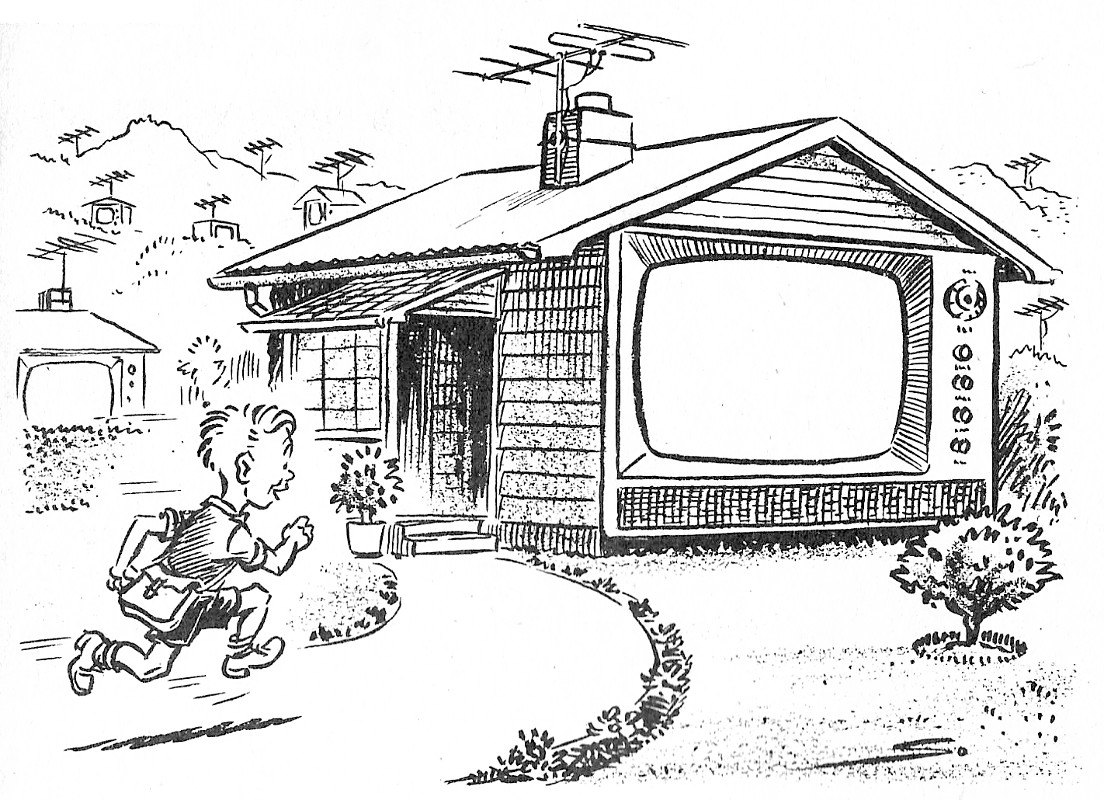
Addiction and the Child
by Ngaio Marsh
Originally published in the TV Weekly May 16, 1966.
If there are such beings as compulsive Viewers, I am not one of them. And yet I fancy it is because I am afraid of joining their ranks that I do not have television in, my house.
I did have it, for over a year, in London, and during the months when I was writing, needed, in respect of The Box, to exercise a degree of self- discipline that I couldn’t always command.
It was, I found, so fatally easy to switch on and hope for the best rather than select and opt out when the chosen programme didn’t come up to expectations.
On the other hand, between the BBC and Commercial TV, there were so many items, rivetting enough to give one an excuse for not missing them.
I should hate to know the amount of time I have squandered waiting like an inert Micawber for something to turn up. Equally, I should hate to have missed many superb productions that held me back from my work.
Of course, when I began myself to appear in a serial feature, my interest sharpened and altered and my tendency towards addiction intensified while, at the same time I became increasingly critical of the medium.
This ambivalent attitude roughly defines the viewers’ basic predicament: do we lose more by abstention than by participation? What, in the end, does television do to and for its audience?
Out of this, and it seems to me most importantly, what is its impact upon children and can one generalise about it?
Here are some cases known to me during my stay in England.
Small House
The first concerns a Kentish family living in a small cottage on an estate where the parents were employed: the mother as a maid in the “big house” and the father as a dairyman on the farm. Their three children were at school and had a certain amount of homework to get through in the evenings.
Their mother told me that her husband had bought a telly on hire purchase and had become completely besotted on it. It was switched on as soon as he came home in the evenings and left on until the close of the late night session. The children were demoralised.
However much she tried to organise there was nowhere, in the tiny cottage, where they could do their home- work out of range of the telly. When they wont to bed they were within sound of it and would sneak out to watch and listen.
She said, graphically I thought, that whereas they used as a family to have a lot to talk about and tell each other at the end of the day they now did nothing but bolt their food, gawp at the telly and go late to bed
. She was quite desperate about it.
Big House
No such problems beset the parents in the big house. They had a television installed in the staff sitting- room. Their small boys were allowed to go in for the children’s programme but otherwise the room was out of bounds and the telly out of earshot. They had no desire at all to visit it at any other time and often preferred to be read to rather than watch the children’s programme.
In another house that I visited, my hostess was a compulsive viewer, and her television set was in her drawingroom. Her ward, a boy of about twelve, was home for the summer holidays. In the afternoons, while my hostess rested, this boy stayed indoors and half-watched television. He turned it on, lay on the floor and, as far as one could make out, for hour after hour gave it a kind of fitful, nerveless intermittent attention. He was not a particularly intelligent boy and lacked initiative.
This kind of idiot-viewing was, in my opinion, remarkably damaging.
Discrimination
Finally, I stayed in a house where there were. two markedly intelligent little girls of seven and nine. Here, the set was in a distant room. If there was a programme their mother thought they would like to see, she would suggest that they did so.
At first they were immensely interested, but grew less so, and while I was there only watched television very intermittently, being absorbed in their own activities, which were of a highly imaginative kind.
From looking on in these and other households where there were children, I drew conclusions that were afterwards more or less supported by one of those mass investigations that are carried out from time to time in England. They went something like this.
The smaller the house in which The Box is introduced the more baleful the consequences are likely to be as far as children are concerned. This is. unfortunate, since the medium is the most democratic of all the art forms and aerials rise thickest where the houses are small.
When the house is large enough to avoid inescapable proximity to TV the compulsion to view indiscriminately is in inverse ratio to the intelligence and energy of the child. With an intelligent child initial excitement and attraction to The Box tends to shade off into selective and deliberate choice. Certain programmes will always be popular, but there will be little casual or aimless viewing.
Under these conditions and with this sort of child television can be stimulating and agreeably informative. The children’s programmes in England maintain, to a marvel, their high artistic standard.
Control
It seems clear that in very small houses parents should ration not only the children’s use of The Box but their own too, since without such control there is no way of excluding the children as long as they are up and about.
In New Zealand, a nation of small householders, this kind of self-discipline should surely he exercised.
It would be interesting if a correlation could be found between viewing hours and the standard of homework in televisual homes. It would he useful to notice how far reading, games and outdoor activities have yielded to the lure of The Box, and it might do no harm to take a long hard look at the family set-up and decide whether it’s more or less lively since viewers’ behaviourism overtook it.
It doesn’t matter to anybody but themselves whether telly-compulsion overtakes the elderly, and indeed to those who care for them the habit is a godsend. But it does matter profoundly just how far-reaching is the influence of The Box upon children into whose lives it is so light-heartedly introduced.
One wonders if parental viewers in New Zealand concern themselves with this matter and if so, how they pro- pose to cope.


Comments powered by CComment